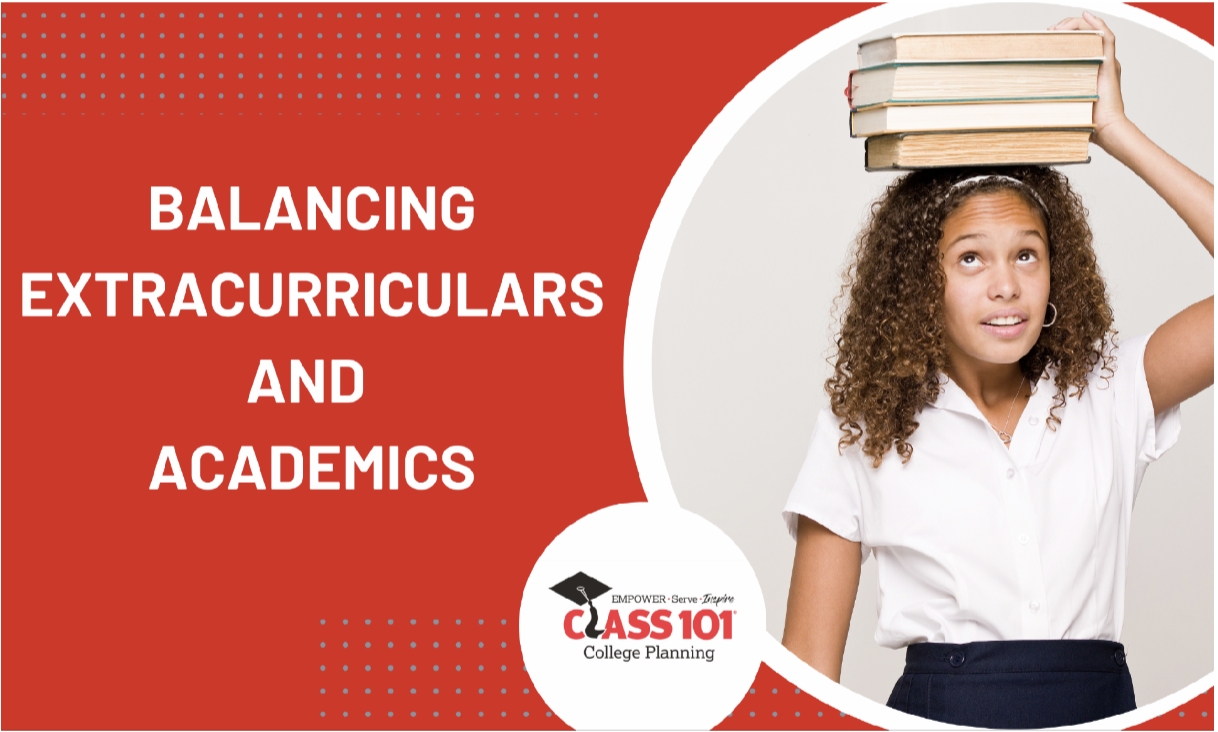July 22, 2024

High school is a time of growth, exploration, and preparation for the future. As students navigate their academic responsibilities, we also encourage them to participate in extracurricular activities that enrich their lives and bolster college applications. Balancing these commitments can be challenging, but with the right strategies, students can thrive in both areas. Here’s how we suggest achieving that balance when we work with students at Class 101.
Understand the Importance of Both Academics and Extracurriculars
Academics are the foundation of your future educational and career opportunities. Strong grades and challenges courses are crucial for both college admissions and scholarship considerations.
However, extracurricular activities also play a significant role. This is one area where we see students make the mistake of avoiding extracurricular involvement in order to focus solely on academics. Not only do extracurricular help develop essential life skills, such as leadership, time management, teamwork, and resilience, they are key to a strong college application. Moreover, they provide a valuable, well-rounded experience and often lead to students discovering their passions. I hope it also goes without mentioning that extracurricular can add so much fun and yes, we are also advocates for a fun high school experience! Here are a few ways to go about striking that key balance between extracurriculars and
academics.
Prioritize and Plan

Time Management Tips

Communication is Key
Evaluate and Adjust
Regularly review your schedule and commitments. Are you meeting your academic goals? Are you enjoying and growing in your extracurricular activities? Adjust your schedule and priorities as needed. It’s okay to step back from some activities if you’re feeling overwhelmed. Don’t forget to take time for yourself by taking breaks and practicing self-care to avoid burnout. It’s important to have fun along the way!
Lean on College Advisors for Help
Balancing extracurriculars and academics requires careful planning, time management, and a willingness to adapt. By prioritizing your interests, setting realistic goals, and maintaining open communication, you can enjoy a fulfilling high school experience that prepares you for future college success. Remember, it’s not about doing everything; it’s about doing what matters most to you.
Balancing extracurriculars and academics is an essential skill that will serve you well beyond
high school. With these strategies, you can excel in both areas, creating a strong foundation
for your college journey and beyond.
Contact us to learn more about how we can help you find the right balance to achieve your college goals.
The college planning journey doesn’t have to be complicated. Call Class 101 to have an expert on your side.
To schedule a free consultation, reach out to us at one of our locations:
Class 101 Brandon, FL | Class 101 Carmel, IN | Class 101 Bloomington, IN

March 12, 2025
8-10. That’s the number of college visits we recommend for each Class 101 student. After advising thousands of high school students through the college selection process, we’ve seen many instances where students with a dream school in mind visit that campus, only to realize that college is nothing like they expected it to be. While […]
Read More >
February 21, 2025
With the cost of college rising, one of the biggest ways Class 101 supports families in their college planning process is by helping them understand and work through financial aid offers. We want to stress that while receiving a financial aid package from a private college or university is an important step toward making higher […]
Read More >
January 13, 2025
ge is an exciting milestone, but it can also bring uncertainty. One possible outcome is receiving a deferral letter from a university. While it’s not the decision most students hope for, a deferral isn’t a “no” — it’s an opportunity.Here’s what a deferral means, why universities issue them, and how you can turn it into […]
Read More >